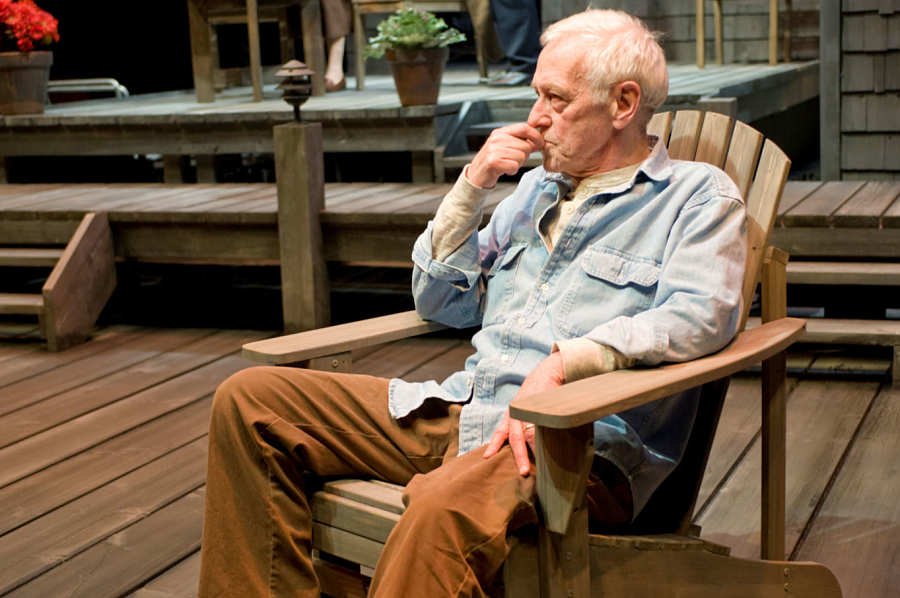John Mahoney, actor of stage and screen and longtime member of Chicago's Steppenwolf Theatre Company, died last week. He was 77.
“An easy man.” That’s what Mike Nussbaum called John Mahoney. Mike, the oldest working actor in Actor’s Equity at 94, did a half dozen shows with Mahoney, and the news of John’s death hit him hard. During Larry Gelbart’s last play, Better Late at Northlight, they would sit in the green room on Sundays before the matinee and race each other doing the Times crossword puzzle.
Those Chicago titans defined what Chicago-style acting meant to me. I worked with them on both sides of the footlights, and John’s passing knocked the wind out of me too.
No nonsense, no frills, no “look at me” sensibility, John tightened his cues and listened hard. He really wasn’t one to talk a play to death either; he preferred to let the play and the playwright speak through him.
And what a glorious instrument he possessed: slim and wiry, with that unique sandpaper voice. He could play tragedy and farce in equal measure. His secret? Truth, the undeniable weapon, which defined him onstage and off. In a profession which is anything but “easy” he made it look effortless. His irrepressible joy in playing for audiences could be felt in the last row.
John was a prankster. His friendship with the late Dennis Farina was filled with gamesmanship to the delight of both. In Born Yesterday at Steppenwolf, while waiting at places John suddenly yelped, “Dennis you’re on! That’s your cue!” Farina, wild-eyed and green as an actor, leapt onto the stage with the house lights still up, the overture still playing and the audience staring at him like the reaction shot in The Producers. That was it: The gauntlet was thrown down. It was war!
Farina was a Chicago ex-cop. One late night he prevailed upon his Oak Park police pals to knock on John’s door. “John Mahoney?” “Yes,” said a stunned Mahoney. “Come with us!” Cuffing John, they escorted him out to the squad car as he protested, “For what?!?! What have I done?” “You’re under arrest…for impersonating an actor!” A howling Farina stepped out from the squad car, triumphant in his revenge.
John and I did four plays together at Northlight. What I’ll never forget are the last few moments of Bruce Graham’s The Outgoing Tide. In this play about a man suffering the onset of dementia, John’s character Gunner announces just before intermission that he’s got a bottle of pills and a fine Irish whiskey, and at dusk the next day he will take his boat out into the bay, and after consuming both he will slip over the side and leave his wife and son $2 million dollars richer. And he wants their permission.
At the end of Act Two he faces his wife (played by Rondi Reed, his Steppenwolf ensemble mate), and quietly says, “Just wave.” It was dry-eyed, unsentimental, and achingly painful. John never indulged, nor did Rondi. They knew each other to their core, and their eyes spoke for them. You can’t direct that kind of integrity. Two Tony winners at the top of their game, talking their truth. Sublime.
He loved to quote Irish playwright Tom Murphy, who said to him one night in a Galway pub, “To the Irish John, the theatre is sacred!” And John was a high priest.
John loved Galway and its audiences, and they loved him, stopping him on the street to chat as if they were neighbors and John was just back from a holiday in the states. They would scalp tickets to see him at the Town Hall Theatre. We did three shows there together.
For me John was a role model. He built his career in Chicago. When the world came calling he answered, but he always came home to share his gifts with humility to the audiences that taught him his craft. John lived for the stage, and performing for his fellow Chicagoans was enough—more than enough. He grew old with those audiences, and as his talent got richer, so the rewards of playing for his homies grew. He was most alive in a darkened room full of strangers who felt he was their friend. They were buoyed by his infectious laugh, they shared his sorrow, they trusted his truth.
I watched John play eight times a week, soldiering through so many illnesses, but he was valiant, near heroic. Alas the body could only take so much.
Tracy Letts, who did The Dresser with John, when accepting his Tony for Who’s Afraid of Virginia Woolf?, famously said, “We are the ones who say it to their faces and we have a unique responsibility.” John Mahoney bore that responsibility with grace and lightness and joy.
He was “an easy man.”
B.J. Jones is the artistic director of Northlight Theatre in Skokie, Ill.


